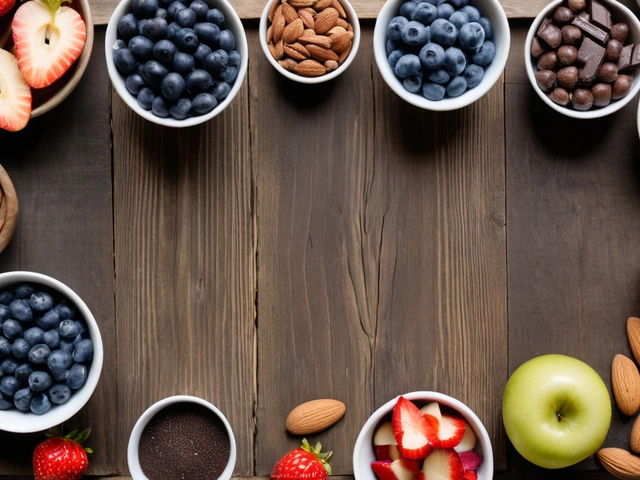Mindfulness and gratitude, while powerful individually, become transformative when combined. Each day is filled with moments that can either be overlooked or deeply appreciated. Mindfulness teaches us to live in those moments, to truly inhabit them, while gratitude encourages us to cherish them.
By consciously integrating both mindfulness and gratitude into our daily lives, we shift our focus from what we lack to what we possess, from chaos to calm. It's not merely about acknowledging what is good in our lives, but also about experiencing it fully, with open-hearted participation.
- Understanding Mindfulness and Gratitude
- Benefits of Combining Mindfulness and Gratitude
- Practical Tips for Daily Practice
- Real-Life Success Stories
- Overcoming Challenges in Practice
Understanding Mindfulness and Gratitude
Mindfulness and gratitude are two practices deeply rooted in psychological and spiritual traditions, each acknowledged for their transformative effects on personal well-being. Mindfulness, originating from ancient meditative practices, is the psychological process of bringing one's attention to the present moment. This practice encompasses not just awareness of present activities but also a non-judgmental and open-hearted engagement with them. It's about observing thoughts, feelings, and sensations as they happen, without interference or overreaction.
Gratitude, on the other hand, is an emotional expression of appreciation for what one has, as opposed to a constant reaching out for something new or better. It shifts our focus on abundance rather than lack, fostering an attitude of thankfulness even for the smallest joys in life. When practiced consistently, gratitude has the potential to enhance mental health by reducing stress and promoting a sense of peace and satisfaction.
To truly integrate these practices into one's life, understanding their interrelationship is crucial. While mindfulness keeps us in the present, gratitude allows us to appreciate that present fully. This synergy not only enhances our emotional state but also contributes to higher levels of happiness and a deeper sense of contentment. Scientific studies support this, revealing that regular practice of these methods can lead to improvements in both mental and physical health. For instance, mindfulness has been linked to reduction in anxiety and depression, while gratitude is correlated with improvements in sleep and resilience.
Several renowned thinkers and researchers have praised these practices. Jon Kabat-Zinn, the pioneer of the Mindfulness-Based Stress Reduction (MBSR) program, defines mindfulness as 'the awareness that arises from paying attention, on purpose, in the present moment, non-judgmentally.' This encapsulates the essence of mindfulness as not just a meditative practice but a way of being.
Embracing mindfulness and gratitude can remarkably transform the quality of life, fostering a greater appreciation for everyday experiences and interactions. These practices are not a one-time activity but a continuous journey that enriches one's life gradually but profoundly. As we learn to anchor in the now with mindfulness and appreciate it with gratitude, we reclaim control over our emotional wellbeing, setting a foundation for lasting happiness and satisfaction.
Benefits of Combining Mindfulness and Gratitude
When mindfulness meets gratitude, the synergy can play a pivotal role in enhancing our mental and emotional health. Mindfulness, the art of staying present and engaged in our current activity, helps us recognize the beauty of the moment. On the other hand, gratitude shifts our focus towards appreciation, cultivating a sense of abundance and contentment. This unique combination encourages a more joyful and fulfilling life.
Research consistently supports the positive impacts of practicing mindfulness and gratitude together. According to a study published in the Journal of Personality and Social Psychology, individuals who kept a gratitude journal and practiced mindfulness reported greater overall satisfaction with their lives. They also showed fewer signs of stress and depression, comparing favorably to those who only engaged in one of the practices or neither.
From a neurological perspective, these practices stimulate the brain's regions associated with positive emotions and reward. Functional MRI studies reveal that gratitude activates the brain's hypothalamus, which is responsible for regulating stress. Meanwhile, mindfulness practice thickens the prefrontal cortex, enhancing attributes such as decision making and emotional resilience. Together, these practices not only improve your current mood but also fortify your mental health over time.
Adopting daily routines that incorporate both mindfulness and gratitude can lead to enduring changes in how we perceive and interact with the world. For instance, starting the day with a five-minute meditation focusing on things you're thankful for can prime you for a more optimistic and proactive day. Similarly, ending the day by reflecting on moments you truly embraced can reinforce the habit of seeking out positivity.
Moreover, the interplay between mindfulness and gratitude enhances relationships. Acknowledging and appreciating small gestures, actively listening during conversations, and being fully present can strengthen bonds. Such behaviors foster deeper connections and promote mutual respect, which are essential for healthy, supportive relationships.
Practical Tips for Daily Practice
Integrating mindfulness and gratitude into daily life might seem daunting at first, but with consistent practice, it becomes more effortless and a natural part of your routine. Begin by setting aside a few minutes each day to focus solely on your practice. This could be first thing in the morning, which sets a positive tone for the day, or in the evening, allowing you to reflect and be thankful for the day’s gifts. The key is consistency, as it cultivates a habit that forms the bedrock of a more mindful and grateful existence.
To aid in your practice, consider keeping a gratitude journal. Every night, write down three things that you were grateful for during the day. This not only helps you focus on the positive events but also serves as a great way to look back and remember all the good that has happened over time. Writing reinforces memory, so this practice can significantly enhance your ability to notice and appreciate the positive aspects in life, even during challenging times.
Another effective method is mindfulness meditation. Spend at least five minutes a day in a quiet space, focusing on your breath. This practice helps in centering your mind and bringing you back to the present moment, which is a core aspect of mindfulness. It’s essential here not to judge how well you’re doing. The goal isn’t to clear the mind completely but to be aware of thoughts and feelings without attachment, observing them come and go like waves on a shore.
Incorporating mindfulness in regular activities can also enhance your practice. When eating, for example, try to really taste your food, appreciate its texture, and think about its ingredients and the effort taken to prepare the meal. This method not only increases gratitude but also improves your eating habits by making you more mindful of what and how much you eat. Similarly, when walking, be aware of your surroundings, the feel of the ground under your feet, the smells, the sounds, and the sights. This practice, known as mindful walking, can be a great way to cultivate a deeper connection with the environment.
Finally, it is important to be patient and kind with yourself as you develop these practices. Some days will be easier than others. On tough days, rather than getting frustrated, gently remind yourself that mindfulness and gratitude are ongoing practices—not tasks to be perfected. Each step, each breath, and each moment of thanks is a progress, moving you towards a more thoughtful and fulfilling life.
Real-Life Success Stories
Every transformative idea or practice has its testimonials, and the synergy of mindfulness and gratitude is rich with personal success stories. Among these, the account of Emily, a school teacher from Vermont, remains particularly impactful. After incorporating mindfulness and gratitude into her daily routine, Emily noticed a profound decrease in her stress levels and an overall improvement in her job satisfaction. 'I suddenly found joy in little interactions with my students and felt less overwhelmed by the challenges,' Emily shares. This significant shift was not only felt by her but also reflected in her teaching evaluations, which greatly improved.
Another compelling narrative comes from Mark, a retired veteran, who struggled with persistent feelings of alienation and anxiety. When introduced to mindfulness exercises and daily gratitude journaling, he initially doubted their efficacy. However, the simplicity and accessibility of these practices allowed him to engage consistently. Over time, Mark experienced a noticeable improvement in his mood and relationships. He credits these practices with providing him a structure to recognize and celebrate the good in every day.
Stories like these are not merely anecdotal. Research supports the beneficial effects of mindfulness and gratitude on mental health. For instance, numerous studies have shown that these practices can lower symptoms of depression, enhance emotional regulation, and even improve sleep quality. Such research brings empirical heft to the personal testimonies recounted here, affirming the life-enhancing value of integrating mindfulness with gratitude in daily life.
As these stories illustrate, the journey of integrating mindfulness and gratitude into one's life is both personal and universal. While the specifics might vary, the underlying theme remains the same: a deeper appreciation for the present and a more resilient, joyous approach to everyday living. These narratives not only inspire but also serve as a practical guide for others seeking similar transformational change.
Overcoming Challenges in Practice
Despite the apparent benefits of mindfulness and gratitude, incorporating them into daily life isn't without its hurdles. Many individuals start with enthusiasm but find sustaining these practices challenging over time. The hustle of daily routines, stress from work, and life's unpredictable nature can all make it difficult to maintain a focused and appreciative mindset. It's crucial to recognize that these obstacles are part of the journey and overcoming them can greatly enhance personal growth and well-being.
One common challenge is the perceived lack of time. How often have we told ourselves we're too busy to sit quietly or to reflect on what we're thankful for? It's an understandable dilemma in today's fast-paced world. Yet, it's not about finding time, but making time. This shift in perspective is vital. Allocating even a few minutes for mindfulness or gratitude exercises daily can become a pivotal part of managing stress and fostering a positive outlook.
Distractions are another significant barrier. In an age where technology constantly vies for our attention, finding moments of peace can seem nearly impossible. The trick lies in setting boundaries. Perhaps it involves turning off notifications during a brief meditation or keeping a gratitude journal by the bedside, away from electronic devices. Such small changes can lead to forming new habits that significantly improve one's ability to stay mindful and grateful.
Another notable challenge is skepticism—either from oneself or from others. Some might view these practices as too simplistic or question their effectiveness. Addressing this skepticism can start with education and personal experimentation. Witnessing the benefits firsthand can turn a skeptic into a believer. It's also helpful to connect with a community of like-minded individuals who practice mindfulness and gratitude. This can provide encouragement and motivation to continue despite doubts.






